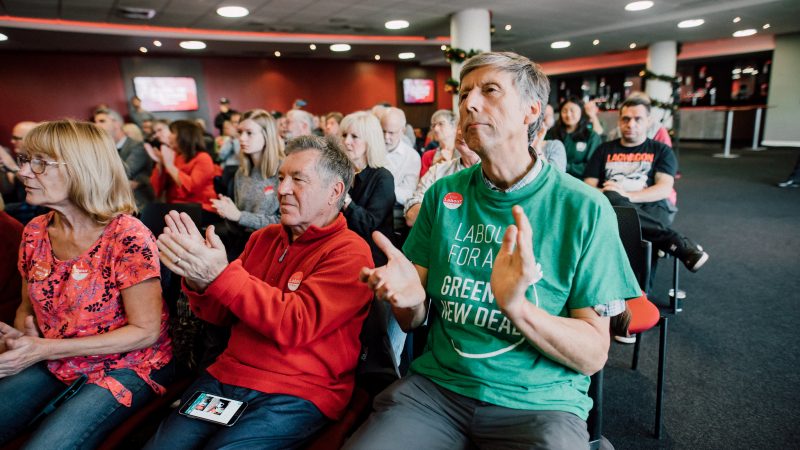
The conference motion on the climate crisis promoted by Labour for a Green New Deal has been ruled ‘out of order’ by the conference arrangements committee on the recommendation of party staff, according to the campaign group.
The policy motion, which is backed by Momentum, the Fire Brigades Union and MPs such as Rebecca Long-Bailey, Zarah Sultana and Clive Lewis, has been sent to Labour conference this year by 21 local parties.
Labour for a Green New Deal had been expecting the motion to receive strong support on the conference floor. The proposal expresses support for the following government policies:
- Mass investment in green technologies;
- Expansion and electrification of public transport, including free local bus networks;
- Just climate adaptation, investing in fire and rescue services, flood defences, and resilient infrastructure;
- Retrofitting all homes by 2030 with mandatory building standards;
- Agricultural transition;
- Universal basic services, including:
- National Care Service;
- Universal free broadband;
- National Nature service including ten new national parks and strategic rewilding.
Many policy motions were submitted by local parties and affiliates to conference on the subject of a green new deal and it is set to be included on the priorities ballot, which means the policy will be debated.
But the CAC has decided that the ‘green jobs revolution’ motion specifically – which addresses unemployment and public health as well as the climate crisis – should not reach conference floor because it “covers more than one subject”.
Sources supportive of the motion have highlighted that similar motions have been brought to conference in recent years, however, such as the 2019 GND motion. LabourList understands that an appeal against the blocking will be heard on Monday.
Chris Saltmarsh, co-founder of the Labour for a Green New Deal group that brought the motion, said: “By interfering to block this motion, the CAC and party staff have stifled the will of members.
“It makes a mockery of party democracy and further exacerbates unnecessary division between the leadership and the Labour membership. It also sends entirely the wrong message to voters: that Keir Starmer’s Labour is uninterested in the bold solutions we need to tackle the climate crisis.”
Momentum has issued a lengthy statement describing the CAC decision as a “disgraceful rejection of our responsibility to each other, to younger generations and to the rest of the world” and noting that “our policies in this area cannot be siloed into isolated, ineffective parts”.
Co-chairs Gaya Sriskanthan and Andrew Scattergood added: “There can be no doubt this was a stitch-up to keep progressive policy off the agenda. While the right had a majority at today’s meeting of the Committee, the recommendation to remove the Green New Deal motion came directly from Labour Party staff.
“Responsibility lies with David Evans and with Keir Starmer, who pledged in his leadership election campaign to put the Green New Deal at the heart of everything we do.” It calls the leader’s campaign pledges “worthless”.
Labour to Win co-director Luke Akehurst said: “A lot of spluttering about one organisation’s model motion on Green New Deal being ruled out by CAC because it drifted into multiple topics. But sounds like other motions on Green New Deal that were better, more tightly, drafted, have been ruled in. I.e. fuss about nothing.“
Under Starmer’s leadership, the Labour Party has committed to a Green New Deal, starting with £30bn of new investment to create 400,000 jobs in manufacturing and low carbon industries. This particular motion urges the party to go further by backing universal basic services and other policies not yet endorsed by the frontbench.
Labour for a Green New Deal has announced that it will hold a demonstration outside Labour conference on Saturday 25th September at 1.30pm to demand that the party put the motion back on the agenda.




More from LabourList
‘Hope starts young: Why Labour must tell the story of a better tomorrow’
LGBT+ Labour suspends AGM amid fears of legal action over trans candidates running for women’s roles
‘Hyperlocal messaging can help Labour win elections: Here’s how’